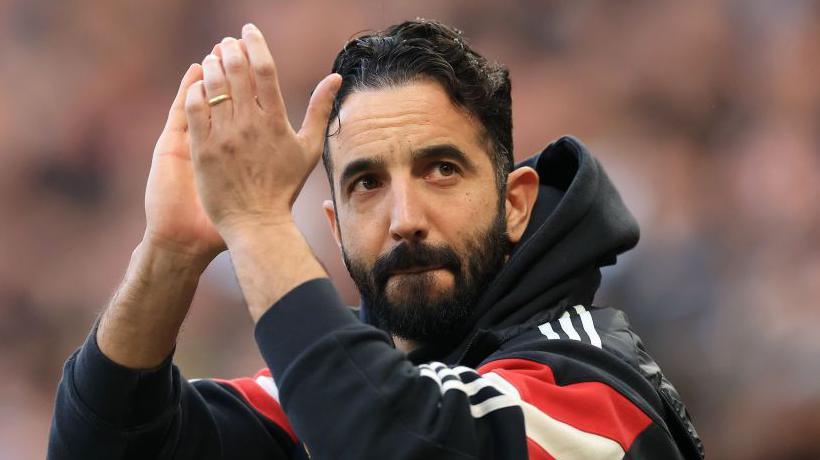### Overview of Ruben Amorim’s Tenure at Manchester United
Ruben Amorim has been managing Manchester United for nine months, a period of immense scrutiny and pressure within one of the world’s most famous football clubs. His recent remarks indicate the magnitude of challenges he faces, drawing parallels to notable figures like Sir Alex Ferguson, who famously reflected on difficult times in his era as a manager.
Amorim’s statements were particularly poignant after a challenging season, during which he acknowledged the need for reflection and transformation, stating, “I want to apologize for this season. Now, we have to make a choice or we stay stuck in the past. We either fight each other or we stick together and move forward.” This commitment to moving beyond the tumultuous past aims to restore a sense of optimism around the club.
### Pressures of Leading Manchester United
Amorim openly recognizes the pressure tied to managing a club like Manchester United, remarking, “I am always under pressure to perform.” Such expectations are compounded by the club’s massive global following, which weighs heavily on the players and coaches alike. The magnitude of fan expectations is significant, as evidenced by recent international tours of the squad where tens of thousands showed up, amplifying the scrutiny under which Amorim operates.
Despite an overall record of 15 wins and 16 losses, including a heartbreaking defeat in the Europa League final, Amorim’s strategy has been to instill resilience and a forward-looking perspective in his players. He is seeking to shift the team’s mentality and performance on the pitch, fostering an environment that encourages player responsibility and engagement.
### Management Style and Adjustments
To manage the substantial expectations, Amorim is adopting a more focused approach to his daily tasks. He has established a leadership group comprising key players such as Bruno Fernandes, Harry Maguire, and Lisandro Martinez to share the weight of responsibility within the squad’s dynamics. This arrangement allows him to devote more attention to tactical development and on-field training, which he considers paramount.
In addition to reshaping the squad’s structure, Amorim has reduced his media engagements, a strategic move intended to facilitate more time “on the grass,” fine-tuning training sessions and player interactions. His amicable, open demeanor encourages positive relationships both with players and fans, differentiating him from previous management who may have adopted a stricter, distance-oriented approach.
### A Critical Season Ahead
Looking ahead, Amorim faces an extremely challenging start to the upcoming season, with fixtures against top competitors like Arsenal, Manchester City, and Chelsea lined up. As he navigates these critical games, the assessment of his strategy and player performance will become increasingly relevant, particularly given the substantial investments made in new talent such as Matheus Cunha, Bryan Mbeumo, and Benjamin Sesko.
Amorim’s tactical framework, focused on a specific formation and a new midfield strategy featuring Fernandes deeper in the field, marks a significant shift from prior management. However, early signs suggest that adapting the lineup to achieve cohesion might come at a cost, impacting existing players whose positions and roles may be altered.
### The Roadmap to Success
Ultimately, Amorim’s objectives extend beyond merely winning individual games; his ambition is to re-establish Manchester United as a competitive force in both domestic and European football. His candid acknowledgment of past failures and commitment to improvement signal a broader perspective focused on growth, both individually for players and collectively as a unit.
While Amorim has expressed his goals for European qualification, the pathway is laden with challenges. Judgements based on short-term outcomes will need to be balanced against a long-term vision for the club, as he has communicated the essential need for time, patience, and support from the fans.
With clear targets articulated, the pressure now rests firmly on Amorim’s shoulders—not only to foster development among players but to rekindle the glory days associated with Manchester United. The forthcoming season may very well determine not only his future at the club but also the trajectory of Manchester United’s illustrious history.












